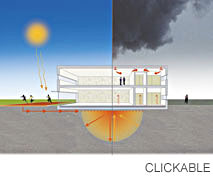Decarbonising Heating
With rapid decarbonisation of the National Grid, carbon emissions from electric heating are reducing each year. Defra publishes projections of the carbon grid intensity of the grid each year in grams of CO2 emitted for each kWh generated: gCO2/kWh.
By 2020 the carbon emissions from direct electric heating, using Grid electricity, are lower than the carbon emissions from burning natural gas on site.
It is worth reviewing what the relative carbon emissions are in 2020 for different forms of heating, compared to burning natural gas for heating. Using the Carbon Grid Factor for 2020 of 136 gCO2/kWh published by BEIS on 11 April 2019:
| Fuel | Mechanism | System efficiency | Fuel carbon factor gCO2/kWh in 2020 |
Emissions vs natural gas |
| Coal | combustion | 75% | 321 | +98% |
| Biomass | combustion | 75% | 305 | +88% |
| Oil | combustion | 85% | 247 | +34% |
| LPG | combustion | 85% | 215 | +17% |
| Natural gas | combustion | 85% | 184 | - |
| Direct electric | resistance | 100% | 136 | -37% |
| Electricity / ASHP | heat transfer | 240% | 136 | -74% |
| Electricity / GSHP | heat transfer | 340% | 136 | -82% |
| Electricity / GSHC | heat transfer | 540% | 136 | -88% |
| Green Electricity / GSHC | heat transfer | 540% | - | -100% |
The lesson from the table is that if we want to reduce carbon emissions from heating we need to stop combustion.
Heating by heat transfer is the attractive alternative.
When is electric heating cheaper than gas heating?
It is already cheaper to run electric heating than gas heating if using a ground source heat pump with a Co-efficient of Performance of 3.4 (compared to a gas boiler with a conversion efficiency of around 85%).
That is even before receiving the RHI.
A well installed commercial GSHP installation should achieve a CoP of well over 5 if recycling the heat derived from cooling in the summer through the ground for heating in winter: joined-up heating.
The savings will also be higher if a well-tuned control system is exploiting Demand Side Response to reduce the average cost of electricity used.
That was the position in 2019.
In 2020, when even direct electric heating emits less CO2 than gas, the CO2 savings of using a ground source heat pump will be 82%, compared to burning natural gas. Savings would be 100% if green electricity were used.
The route to lower carbon emissions for heating
If we are serious about controlling carbon emissions, we need to stop combustion of carbon fuels and move towards the electrification of heat.
That means installing ground source heat pumps now.
Not just for off-gas grid areas, but for all on-electric grid areas as well.
Carbon Emissions Calculator from GSHPs using Grid Electricity
The current carbon emissions from different heating systems are shown below in a small program that updates to the current grid carbon intensity every half hour.
The carbon emissions of heating based on heat transfer are dramatically lower than any heating system based on combustion of carbon compounds.
See Ground Source Heating See Ground Source Cooling See Ground Source Energy

